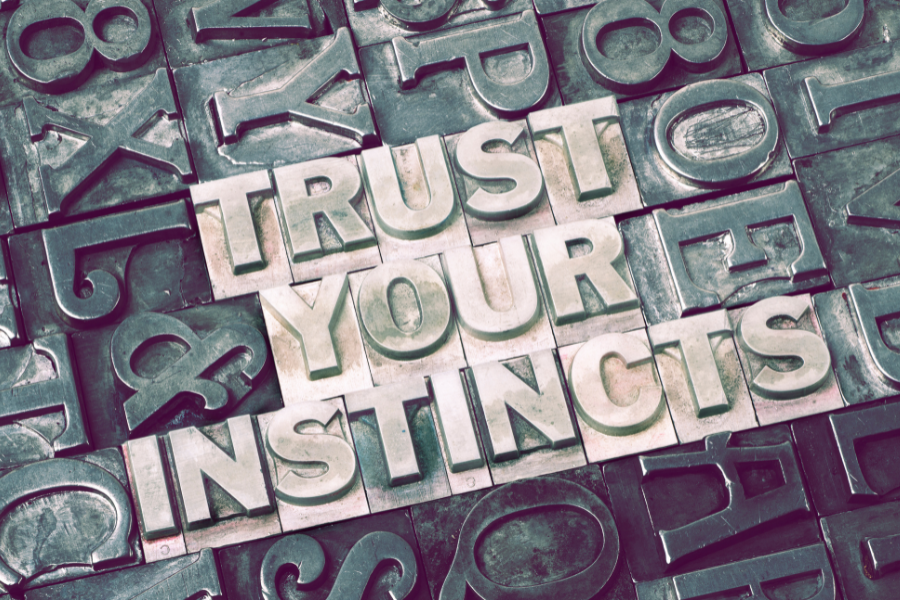
Many practice owners underestimate their abilities as entrepreneurs. Practice stats, financials, HR issues, marketing and other tasks let alone patient care and management, overwhelm some people. Some will tell me they are terrible at business and choose to let someone else handle it.
Practice owners are much better at business than they believe. The reality is that practice owners are business leaders. Therefore, practice owners are faced with important decisions daily. You determine strategic direction, guide hiring, set practice priorities, the list goes on. People make decisions using two different processes; the first is based on logic and facts, and the second is based on intuition. This is where I feel practice owners do not give themselves enough credit.
Obviously, we must look at the facts. But have you thought to yourself when you do see the facts, “I’m not surprised, I felt that was not right at the time…”
We do not want to trust our instincts as much as we should because it means we must pay attention to our emotions. Oftentimes we need to remove the emotion from a difficult situation.
Why Don’t We Trust Ourselves?
Controlling emotions is more important when it comes to reacting to a situation. But what about when making decisions? What if you have the facts, but there might also be competing or incomplete information? In these cases, trusting in intuition becomes a valuable leadership competency. As Bill Gates says, “often you have to rely on intuition.”
Sometimes, people do not want to trust their intuition. It is important to discern between intuition and fear. We have all faced a situation where we were simply afraid to take action. Fear tends to be accompanied by bodily sensations, you may feel tense, panicky, or desperate. Fear has a pushing energy, as if you are trying to force something, or selecting an option because you want to avoid a threat, rejection, or punishment.
Fear also tends to be dominated by self-critical thoughts that urges us to hide, conform, or compromise yourself. Intuition on the other hand has a pulling energy, as if your choice is moving you toward your best interest, even if that means pursuing a risk or moving more slowly than others. This is usually accompanied by feelings of excitement and anticipation or ease and contentment.
Physically, gut feelings tend to cause your body to relax. With intuition, your inner voice is more grounded and wiser, like a good mentor. And remember, using intuition does not mean you have to make a quick decision. An intuitive decision can still take a few days.
Whenever I have important decisions to make, I do trust my instinct or my gut. Try asking yourself:
Do I pay attention to my first reactions about a given issue?
When I am faced with a decision, do I consider my feelings in addition to the facts?
Do I check in with my gut feeling after summarizing the pros and cons?
Do I pay attention when my gut sense is at odds with the available information?
To help use your intuition more, simply slow down. We answer our texts and emails far too quickly. We may feel compelled to make a quick decision despite being extremely tired. It is hard to slow down given the pace we are all running at. But taking a step back is important and necessary to access intuition.
The next time you are faced with an important decision, take some time to get out of your head and away from your office. Go for a walk. Do not feel the need to respond quickly. Just sit with the decision, ponder alternatives, and try brainstorming new solutions. As you do so, tune in to your emotions and evaluate your reactions to understand how intuition might be leading you in this situation.
What about the time your intuition failed? Did it really fail? Or did you let biases get in the way? There will be times when intuition leads you astray because mistakes can be attributed to unconscious biases. Biases are cognitive distortions that manifest in personal preference or misleading assumptions.
Have you noticed when you decided too quickly or were overconfident, that is when things went wrong? Whenever you let your biases interfere with your decisions, they skew your objectivity leading to the wrong decision. Your gut did not let you down but rather you chose to listen to your personal opinions that influenced your judgement.
Anchor Your Intuition with Core Values
The next time you have a decision to make, try and engage your intuition. It is always important to remind yourself about your core values and what is most important to you. Examples include service, stability, family, or calmness. Perhaps you are feeling agitated after a long day at work when nothing went your way. Your core values can help you pinpoint the source of your frustration and understand it more clearly. Using your values, you can check-in to figure out what feels off internally and gain perspective on the situation. Remember, your core values represent what is most important to you so do not be afraid to fall back on them.
I am confident that people who pride themselves on having a strong intuition, honed through years of experience, helps guide their decisions. Others will be ambivalent about relying on their intuition to make important choices because they are concerned that their gut reaction is inherently biased or emotional. This latter group is no doubt responding to the oft-given advice that we should use formal data and analysis to “check” our intuitions.
So, who is right? Should leaders make decisions based on their gut feeling, or should they not?
Please do both. Facts speak loudly and clearly; they cannot be dismissed. But remember to listen to your inner voice. Go to a quiet place, clear your mind, remove fear and biases, and truly listen to your instincts. They will not lead you astray.
A challenge for you after reading this article is to take a moment today or tomorrow to reflect on what your top one to three values may be. The next time you find yourself struggling to make a decision, ask yourself, “which action or decision brings you closer to those core values?” Going within can help dissolve the internal tension that leads to mental loops.
Finally, keep in mind that intuition cannot flourish in busy, stressful environments. Give your mind space to wander and make connections. Remember, while intuition is not perfect, it is also a decision-making tool you are underutilizing, at the moment. Trust yourself a little more and you will be surprised to find that your gut is a more powerful decision-making tool than you may have realized.
You are a practice owner and entrepreneur for a reason. Embrace this role. Sometimes a big challenge is the dislike one may have for leadership. The more you fight it, the harder it can be.
Implement systems that help you manage effectively. Always remember, you are not in this alone. There are resources available if only you choose to reach for them.

JACKIE JOACHIM
Jackie has 30 years of experience in the industry as a former banker and now the Chief Operating Officer of ROI Corporation. Please contact her at Jackie.joachim@roicorp.com or 1-844-764-2020.








